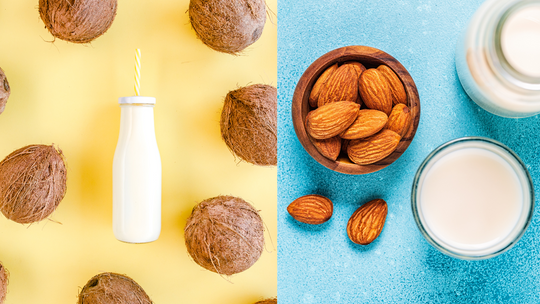Coconut Milk vs. Almond Milk – Why Coconut Milk Reigns Supreme
Posted on August 10 2023,

In recent years, the world has witnessed a remarkable shift towards plant-based alternatives to traditional dairy products. Two of the most popular options, coconut milk, and almond milk, have risen to prominence as versatile substitutes that cater to various dietary preferences. While both milks have their merits, we are here to make the case for why coconut milk stands out as the superior choice. From its rich nutritional profile to its culinary versatility, coconut milk undoubtedly earns its place as the reigning champion in this creamy showdown.
Nutritional Powerhouse
When it comes to nutrition, coconut milk takes a leap ahead of almond milk. Coconut milk is naturally rich in healthy fats, particularly medium-chain triglycerides (MCTs), which have been associated with numerous health benefits, including improved cognitive function and weight management. MCTs are readily metabolized by the body for quick energy, making coconut milk an excellent choice for a sustained energy boost.
Moreover, coconut milk contains essential minerals such as magnesium, potassium, and iron, which contribute to maintaining proper bodily functions. The presence of iron is particularly important for vegetarians and vegans who may have an increased risk of iron deficiency.
Creamy and Flavorful
In terms of taste and texture, coconut milk offers a distinct advantage. Its luxurious creaminess adds depth and richness to both sweet and savory dishes, making it a prized ingredient in culinary creations around the world. From curries to smoothies, soups to desserts, coconut milk enhances the flavor profile of any recipe it graces.
Almond milk, on the other hand, often falls short in comparison due to its watery consistency and relatively mild taste. While almond milk can be a suitable option for certain beverages or recipes, its inability to deliver the same creamy satisfaction as coconut milk limits its application in the culinary realm.
Vitamins Galore
Coconut milk also shines when it comes to its vitamin content. It contains important fat-soluble vitamins such as vitamin E, which acts as a potent antioxidant, protecting cells from oxidative stress. Vitamin E also supports skin health and immune function, making coconut milk a tasty way to fortify your body's defenses.
Almond milk, while a source of vitamin E, lacks the breadth of nutrients found in coconut milk. This disparity highlights coconut milk's comprehensive nutritional package that goes beyond mere sustenance.
Lactose-Free Alternative
For individuals with lactose intolerance or dairy allergies, coconut milk offers a delicious and nourishing alternative to cow's milk. Its naturally dairy-free composition eliminates the digestive discomfort associated with traditional dairy products, allowing individuals to enjoy creamy indulgences without compromise.
Almond milk, though also dairy-free, lacks the same level of creaminess and nutritional density as coconut milk. This divergence further solidifies coconut milk's position as the go-to choice for those seeking a satisfying and nutritious milk alternative.
In the realm of plant-based milk alternatives, coconut milk reigns supreme for a multitude of reasons. Its robust nutritional profile, indulgent creaminess, versatile flavor, and essential vitamins make it the ultimate choice for health-conscious individuals and culinary enthusiasts alike. While almond milk has its merits, it simply cannot match the unparalleled combination of taste and nourishment that coconut milk provides. So, whether you're whipping up a luscious curry or adding a splash to your morning coffee, coconut milk stands tall as the better choice!
Looking for an Organic, quality coconut milk? Shop Fiesta's Organic Coconut Milk here, in either powdered or liquid form.
